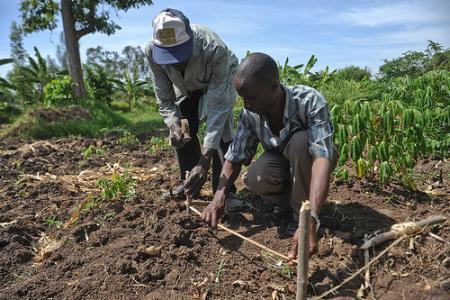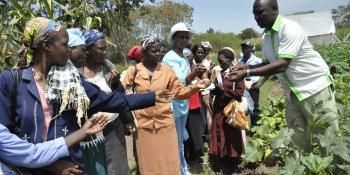Intercrop innovations may help build resilience in semi-arid areas

by Vivian Atakos, John Recha and Philip Kimeli
Kambi ya Mawe, a village in Wote eastern Kenya, was recently a beehive of activity when hundreds of people attended the first smallholder farmers’ field day organized by the local Ministry of Agriculture personnel in late January.
Researchers and extension agents explained to farmers the need for selecting suitable crop varieties that could help them achieve food security under a changing climate. In addition, farmers, together with the researchers and agents, as well as government officials and development practitioners, moved around on the farms, assessing how well the prepared trials of sorghum, maize, cowpea, greengram and bean intercrops had performed for the farmers.
“Since only one out of four rainy seasons in Wote area is reliable, farmers need to diversify their crops and embrace improved varieties of sorghum, cowpeas and greengrams as well,” said Charles Kariuki, the Centre Director for KARI Katumani Research Station.
To build increased resilience in agricultural systems, our East Africa program promotes innovations. This is done by tapping into other CGIAR centres expertise, national and regional research networks, to support adaptation to climate change. One of the strategic initiatives is the establishment of climate smart villages (CSVs) through participatory action research (PAR), where farmers test a portfolio of interventions that will enhance capacity and decrease the vulnerability of rural communities to a variable and changing climate.
In the light of this, a partnership was developed between the International Crops Research Institute for the Semi-Arid Tropics (ICRISAT) the Kenya Agricultural Research Institute (KARI), the Kenya Ministry of Agriculture (MoA) and local smallholder farmers to undertake a participatory evaluation and promotion of integrated sorghum - legume technologies for improved food security and income in the Wote area.
The research initiative was undertaken following a regional science workshop on responding to the research needs on climate change and agriculture in East Africa held in Arusha in June of last year. The research aims to:
- Conduct farmers and end user participatory evaluation of new, available and released sorghum and legume varieties to identify best bets for further dissemination and adoption;
- Develop partnerships with public institutions, private seed companies and agro-dealers in order to provide high quality improved sorghum and legume seeds;
- Establish linkages with other stakeholders for processing and marketing farm produce.

The early maturing, disease resistant, pest tolerant and high yielding crop varieties were developed by KARI and ICRISAT specifically for semi-arid lands. In this research, undertaken during the short rainy season of 2012, a total of 210 farmers from five villages were involved. They planted three improved sorghum varieties namely KARI Mtama I, Seredo and Gadam.
“Sorghum is a good and nutritious food just like maize, and it is better able to thrive and yield under water stress conditions compared to the maize crop” said Muoti Mwangangi, the district extension officer.
The sorghum varieties were intercropped with either improved cowpea or greengram crops, leading to a total of six experimental plots. The six experimental plots were contrasted with a control plot having improved maize and bean intercrop, which are usually planted by all farmers. A “mother-baby trial” experimental approach was used. This involved establishing all the seven plots on one main farm (called the mother trial), and having a set of nearby farmers planting only one variety of the sorghum-legume intercrop (called the baby trial). Each of the five villages had three mother trials, and 39 baby trials. In their monitoring for each trial, the farmers and researchers documented the number of days to maturity, disease and pest incidence, ability to withstand lodging (for sorghum), yield levels and palatability.
The improved varieties of cereals and legumes planted by farmers were products of ICRISAT and KARI. During the field day, people noted that sorghum-legume intercrops were outstanding compared to the maize-bean intercrop. Additionally, it was noted that the Gadam sorghum variety matured faster than the other two sorghum varieties, while cow pea crop appeared to thrive better than the green gram crop. However, since the season recorded above normal rainfall amounts compared to the three preceding ones, it was speculated that some crop varieties (especially cowpeas and Gadam sorghum) were healthier and gave higher yields due to higher levels of soil moisture available during the growing season.
Various demonstrations were done to educate the farmers:
- Making various sorghum dishes like porridge, cakes, doughnuts and blended rice-sorghum
- Use of sorghum and legume residues for preparing livestock feed
- Use of sorghum and legume residues as mulch and compost for soil fertility improvement
- Benefits of using improved crop varieties instead of low quality local varieties
- Improved agronomic practices for higher yield
- Improved post-harvest processing and storage practices to reduce loses and maintain high quality
The CCAFS East Africa strategic initiatives will continually be pursued in Wote and other learning sites. Apart from climate smart villages, other initiatives include:
- Tools for designing adaptation strategies and farmer experimentation approaches to enhance adaptation learning
- Science workshops to respond to regional needs for research and priorities,
- Mainstreaming agricultural issues in climate change policies, and of climate change issues in agricultural policies at all levels.
Knowledge sharing by partners undertaking participatory action research in the CCAFS sites is important in helping farmers make decisions. One of the avenues for sharing the knowledge is farmers’ field days.
Vivian Atakos, John Recha and Philip Kimeli all work for CCAFS East Africa. Vivian is a Communications Specialist, John Recha is a PAR specialist and Philip Kimeli is a Research Assistant. To get more updates on our research work in East Africa, like us on Facebook, and follow us on Twitter @Cgiarclimate_ea


